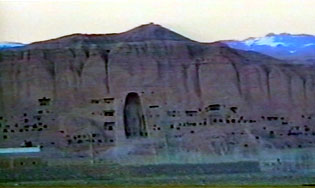Yesterday the first thing I saw was a program of nine short films, most running about thirteen to sixteen minutes and the shortest at four minutes. It was a mixed bag, though none of them were awful.
"At the Quinte Hotel" (Bruce Alcock, Canada)
This is the late Al Purdy (kind of a poor man's Canadian Charles Bukowski) reading his great poem, with Alcock providing animation. He throws up just about every animating style there is in only four minutes, and it's fine but Purdy's words are so descriptive and alive that having visuals to go with it is ultimately unnecessary. Nice little piece I suppose, but the highlight is really hearing Purdy's reading of his own work. You can watch a piece of the short
HERE.
"The Act" (Kraker & Ware, U.S.A.)
This one stars Debra Jo Rupp (
"That '70s Show") as a stand-up comedianne. We see her act on stage, which is mostly about what a lazy, no-good bastard her ex-husband is, intercut with her alone at home dealing with real pain. The idea that comedians turn the tragedy from their life into material for the stage is not at all new, and the slight "twist" of the ending doesn't make it any more satisfying.
 "My Dad Is 100 Years Old" (Guy Maddin, Canada)
"My Dad Is 100 Years Old" (Guy Maddin, Canada)
This one is the biggest reason I had to see this collection of shorts, and I wasn't in the least bit disappointed. Guy Maddin directs this wonderfully odd and heartfelt love letter from his
Saddest Music in the World star Isabella Rossellini. Her Dad was the Italian director Roberto Rossellini, one of the Neo-Realists from the '40s and '50s who's best known work is probably
Rome, Open City (1945). Isabella wrote this exquisite little film in which Roberto is embodied as an enormous talking stomach, as his big belly was something she and her siblings remember fondly from their childhood. All the other parts in the film are played by Isabella herself, and they are Federico Fellini, Alfred Hitchcock, David O. Selznick, Charlie Chaplin and Isabella's mother, Ingrid Bergman. The film consist mostly of these characters all meeting in a movie theater and debating the merits of Roberto's work with his belly - Hitchcock, Selznick and Fellini all critical of his style, Chaplin and Bergman praising it. Beyond what it has to say about Roberto Rossellini's philosophy of filmmaking, it has bigger things to say about art vs. commerce and very specific personal points Isabella wants to make about her father as a man other than his artistry. It's funny and weird and sad and tender and the kind of surreal trip only Maddin could have filmed for Isabella. This is a wet-dream for film buffs.
"Jelly Baby" (Rob Burke, Ireland)
Little piece that feels more like a commercial than a film - though I don't know what they'd be selling (other than Grecian Formula). It's about a young father and his crying baby who he can never seem to calm down, and the twisted opportunistic way he corrects the problem one sunny day in the park. There are a couple nice visual gags, but this was the weakest of the nine.
"Through My Thick Glasses" (Pjotr Sapegin, Norway/Canada)
Sweet animated piece about a grandfather trying to get his young granddaughter to put her hat on to play in the cold outside by telling a long story of his experiences as a boy in World War II. Genuine, but nothing that really knocked me out.
"Hibernation" (John Williams, Great Britain)
A bittersweet piece that mixes animation and live action to tell the story of a yopung boy who died of cancer and his two friends scheming in their treehouse for a way to bring him back to life. It's more than a little schmaltzy, but the bits of dark comedy running through help even it out a bit. Two boys dressed as animals electrocuting themselves is kind of fun, after all.
"Rain is Falling" (Holger Ernst, Germany)
In an unnamed Middle Eastern country (filmed in Morocco), a small girl travels miles of barren landscape to bring water to her sick mother. There is almost no dialogue in the film, and the little girl (Fadma et Tagoum) is captivating on screen. A sad little piece, exquisitely shot, about survival and love.
"Dying of Love" (Gil Alkabetz, Germany)
Animated short about two caged parrots who try to awaken their owner as he sleeps so they can be fed. They start by imitating the sounds of the city they can hear from the window, but soon are recreating in sound the day that they were brought from the jungle, inadvertandly unlocking a secret the man didn't know for all these years. Builds to a decent punchline, but at 14 minutes it felt about seven minutes too long.
"Fluent Dysphasia" (Daniel O'Hara, Ireland)
This one was pretty good, though far from great. It stars Stephen Rea as a man who awakens one morning to find he no longer understands or can speak English, but is now fluent in Gaelic. This is quite distressing, but his teenage daughter, who is studying Irish in school, is able to help calm him. I liked the Bugs Bunny solution to the problem and Rea is good as always, but there wasn't much meat to this one. It does have a sweet ending though, and a few good, hardy laughs.













